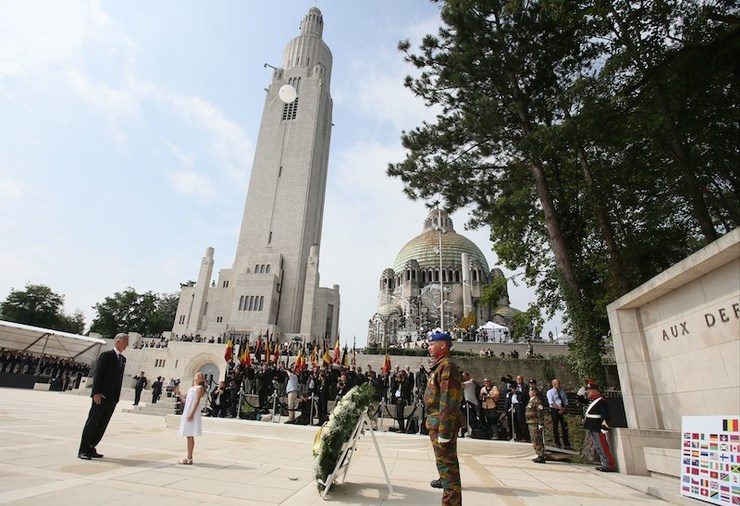SUMMARY
This is AI generated summarization, which may have errors. For context, always refer to the full article.

“Peace has to be a shared goal,” Belgium’s King Philippe told leaders gathered in his country’s eastern city of Liege. “World War I reminds us to reflect on our responsibility… to bring people together.”
Leaders from across Europe – from Britain and Ireland to Germany, Austria, Bulgaria and Malta – attended the commemoration at the Allied War Memorial of Cointe, a tower complex overlooking the city alongside a weathered grey-stone church painted with white doves for the occasion.
French President Francois Hollande recalled Germany’s invasion of neutral Belgium in early August 1914 that turned what had been a localized Balkans war into a global conflagration, raising current day parallels.
“How can we remain neutral today when a people not far from Europe is fighting for their rights?” Hollande said, clearly referring to the Ukraine crisis.
“How can we remain neutral when a civilian airliner is brought down… when there is conflict in Iraq, Syria, Lebanon, Gaza?”
“We cannot remain neutral… Europe must live up to its responsibilities with the United Nations,” he told an audience that included Britain’s Prince William and wife Catherine, heads of state and representatives of some 80 countries.
German President Joachim Gauck said Berlin had launched the war based only on “military logic,” when Europe “must actively champion freedom, the rule of law, awareness, tolerance, justice and humanity”.
Prince William recalls executed nurse
Prince William recalled the German execution of a British nurse, Edith Cavell, who just before her death in 1915 said: “I must have no hatred or bitterness towards anyone.”
“It took another terrible war to learn the truth of her words and even today we continue to learn that lesson,” the prince said.
“The events in Ukraine testify to the fact that instability continues to stalk our continent,” he added.
The leaders gathered in the industrial town of Liege because dogged fighting there had barred the way to invading German troops in the early days of August 1914.
Liege’s fierce resistance derailed Berlin’s plans for a quick victory, while Germany’s invasion of Belgium formally brought Britain into the war, as interlocking alliances that were meant to preserve the peace plunged Europe into the abyss.
The rest is history: 10 million troops dead, 20 million injured, millions of civilian victims, empires toppled, the world remade.
Early Monday, Australian Prime Minister Tony Abbott and his New Zealand counterpart John Key paid tribute to the tens of thousands of their countries’ soldiers who died far from home.
The conflict “was the most cataclysmic event in human history,” Abbott said, “and arguably gave rise to communism, to Nazism, to World War II and the Cold War”.
Mons, first British death
“We should never fail to cherish the peace between these nations and never underestimate the patient work it has taken to build that peace.”
– British Prime Minister David Cameron
Security was very tight in Liege, with all streets leading to the great square and town hall cordoned off, with a heavy police presence.
After Liege, it was the turn of Mons on the French border to remember a do-or-die rearguard action by the first British troops committed to the war as London and Paris scrambled to prevent a German breakthrough in late August.
Prince William, his wife, brother Prince Harry and British Prime Minister David Cameron attended the ceremony in Mons where the first British soldier died.
It was here, too, that the last British soldier was killed on November 11, 1918, the very day of the Armistice that ended hostilities after four bloody years.
Cameron called on the world to “never fail to cherish” peace.
“Here on the continent of Europe we saw not the war to end all wars, but the precursor to another desperate and violent conflict just two decades later,” Cameron said.
“We should never fail to cherish the peace between these nations and never underestimate the patient work it has taken to build that peace.”
The Mons ceremony focused on the small military cemetery of Saint-Symphorien, where 229 Commonwealth and 284 German solders were buried together in a gesture of reconciliation even as the fighting raged.
Queen Elizabeth II attended a commemoration at Crathie Kirk, the small Scottish church used by the royal family when holidaying at nearby Balmoral Castle.
The most striking image of the day was at the Tower of London where hundreds of thousands of ceramic poppies – one for each British soldier killed – were installed flowing out of a gun port and flooding down over the lawns in the moat.
Meanwhile, homes, businesses and landmarks across Britain turned off their lights from 10 pm to 11 pm (2100 GMT to 2200 GMT), inspired by British foreign secretary Edward Grey’s famous remark on the eve of war.
“The lamps are going out all over Europe; we shall not see them lit again in our life-time,” he said in despair. – Rappler.com
Add a comment
How does this make you feel?
There are no comments yet. Add your comment to start the conversation.